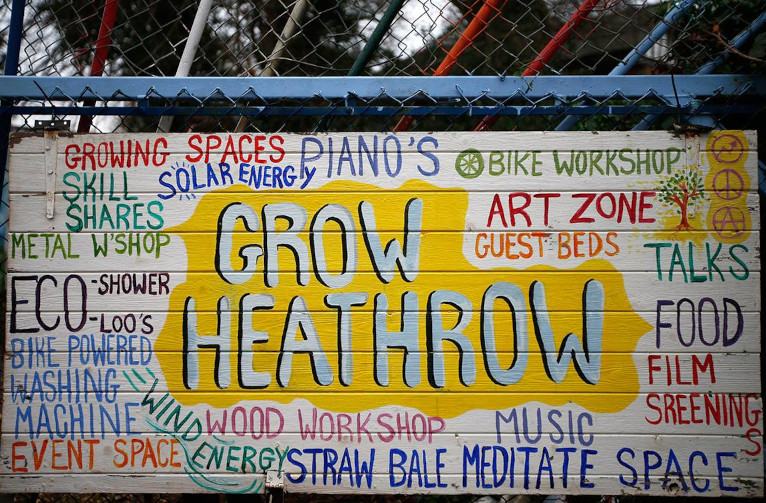The ‘will-they-won’t-they’ struggle of whether Heathrow Airport will get a third runway or not seems never-ending. But regardless of the position of subsequent governments to the proposal (usually favourable) British Airports Authority (BAA) have gone on buying up more and more of the land and properties in the villages that currently sit in the path of the proposed runway. And it was here, in the village of Sipson, in 2010, that a group of activists, calling themselves ‘Transition Heathrow’ squatted a former market garden to create ‘Grow Heathrow’.
They cleaned up the site which had been an unauthorised car scrapyard, repaired the site’s old greenhouse, and became a community skills resource for the wider local community. They beautifully explored that edge where Transition and activism meet.

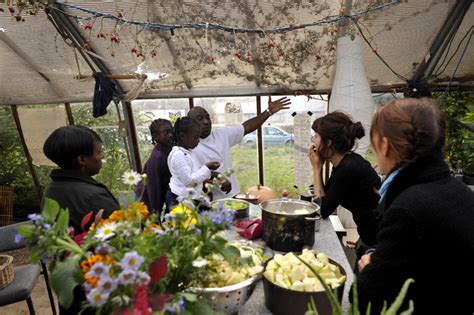

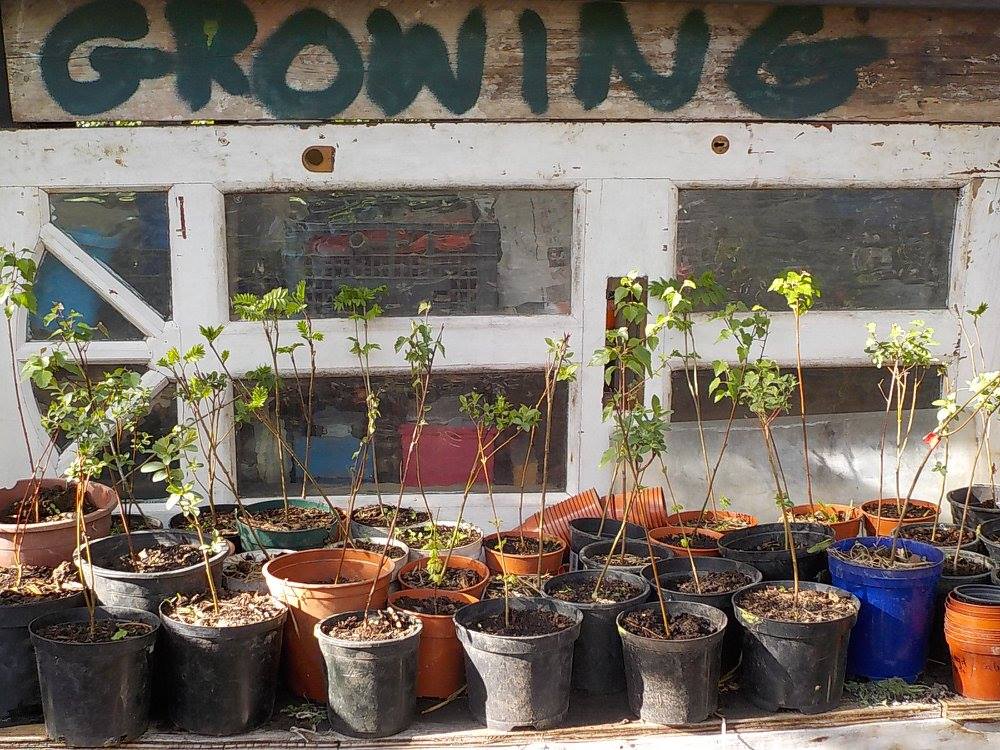
Transition Heathrow turned a site in Sipson which had been farms and gardens up to the 1930s into a growing and community space again
Having resisted one eviction attempt in 2015, half of the site was reclaimed by its owners with an eviction in 2019, followed by the second and final half in 2021. Two years later, the owners have turned the site they put so much money and effort into … a car park. Georgia Woods, one of the founders of Grow Heathrow told me that the project “brought the ‘yes’ of Transition together with the need for resistance, linking the yes and the no”. Sipson has, since Grow Heathrow, become largely a ghost town, with 70% of properties now owned by BAA in preparation for their demolition. Most local businesses have packed up and left.
While many of the original Grow Heathrow team moved on, Georgia remains well-connected in the area and still spends part of her time there, teaching music in local primary schools. Georgia recently met Dr Aanka Batta, a South Asian-born performance poet, curator, mentor and consultant, through a collective called ‘Music4Unity’. Aanka lives in Bournemouth and is a founder of ‘Rising Voices’, a collective of artists of colour who run workshops on decolonisation, creative writing and migrancy.
Aanka’s own experience is one of 15 years as a migrant, 10 years of that being dedicated to her securing permanency. Thinking about how climate justice relates to other experiences of inequality and injustice, Georgia describes how these issues of intersectionality became essentially more present in Grow Heathrow over time; a much-needed trajectory that was echoed in the wider environmental movement. Georgia and Aanka found common ground and started working together on ideas for projects in another of the Heathrow villages of Harmondsworth.
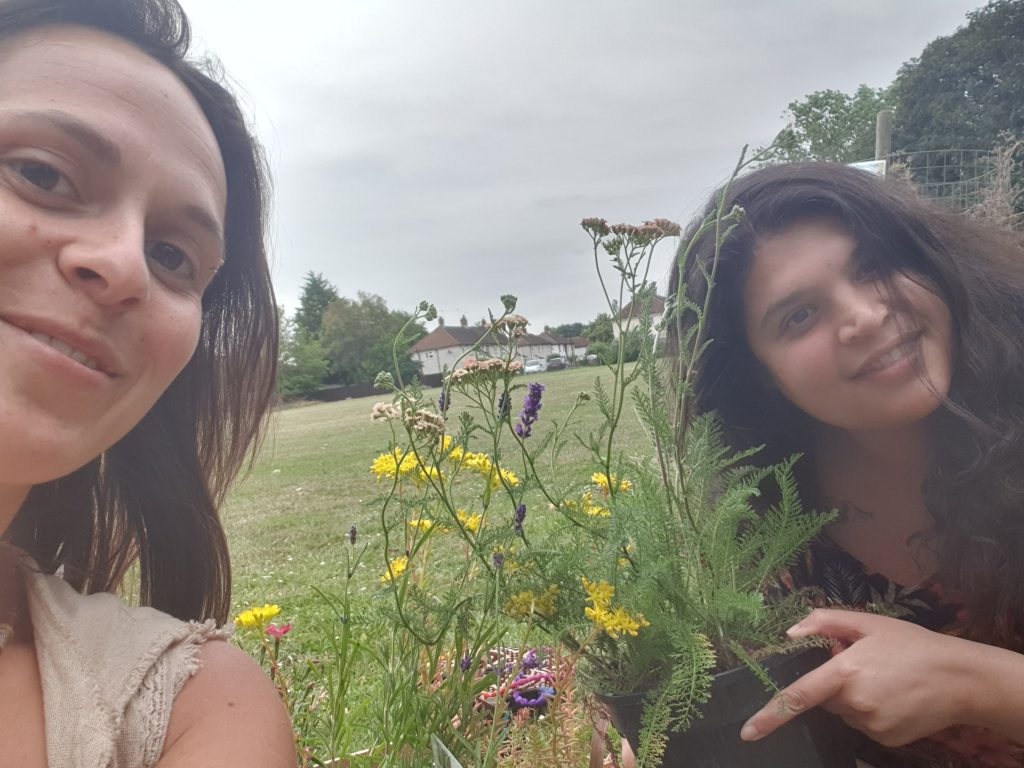
Aanka and Georgia planting a new garden in Harmondsworth, Heathrow.
They applied for the last round of Transition Together Seed Funding, supported by the National Lottery Community Fund, hoping to unlock three projects in the local community. The first is the creation of a forest garden in Harmondsworth within a circle of trees already planted back in the Grow Heathrow days (“a bit like Stonehenge” Georgia says). They’ve built a WhatsApp group of local people who get involved in the garden on workdays, help with watering and so on. The site lies between a Primary School, a residential area and the Harmondsworth Immigration Removal Centre, where people without leave to remain in the UK are detained.
The project also includes developing workshops with local schools on how the realities of migration, inequality and the climate crisis interact, using play and art. They pot and repot plants with the children, as a metaphor for the experience of migrants. Thirdly, they are planning a mural, again working with local schools, based on butterflies and bees. It’s being designed and produced by Sarith, an immigrant artist from Sri Lanka who lives close to Heathrow, featuring the Monarch butterfly, a symbol of migrant rights and freedom of movement. All of these projects are aimed at building a culture of receptivity around difference and bringing people together.
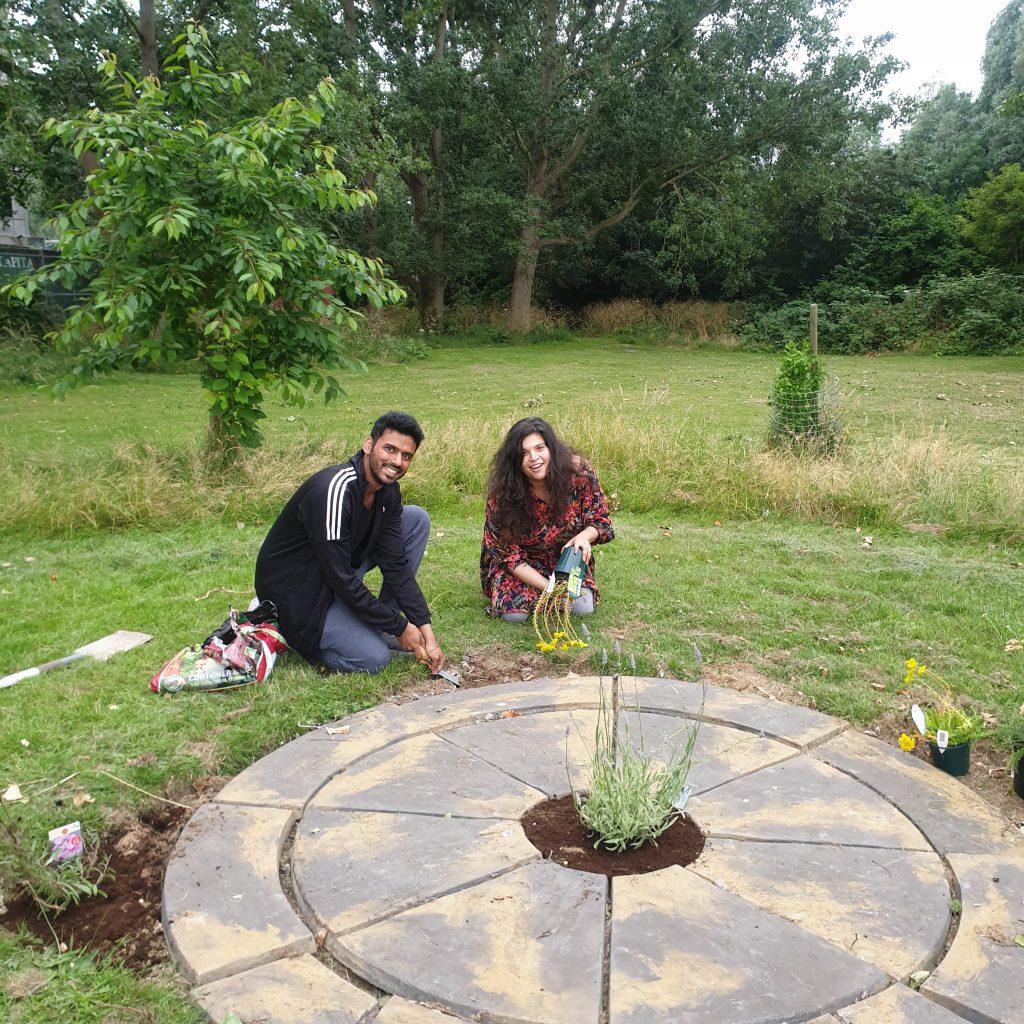
Getting locals involved in the new Forest Garden in Harmondsworth.
“As an immigrant, being part of this project has been amazing”, Aanka, formerly an academic, told me, “it has helped me get out of my shell and get involved with the history of this country, to use so much of what I know in theory and convert that into usable ideas around intersectionality and diversity. I know a lot about intersectionality, the arts and race”, she added, “but I’m playing catchup on the context of the UK”.
“Over the last 10 years”, Georgia adds, “intersectionality has been so much more present in Heathrow as an issue, whether it’s the Stop Heathrow 13, campaigns aimed at stopping the deportation flights and the linking of environmental issues to intersectional issues”. In addition to the other projects, they are starting to film interviews with some of the remaining elders in the community, which will then be interwoven with Georgia’s music and Aanka’s poetry. Georgia has also started working on ‘Heathrow the Musical’.
What does intersectionality mean in a place like Heathrow? Different communities live alongside each other, each with their own history of trauma and exclusion. White working class people, oppressed through the dispossession of their land, being sent off to wars, and now having to contend with the proposed airport expansion and aviation pollution live alongside the south Asian community and others who have had to migrate due to similar reasons in their home countries. It reveals how people’s different identities interact to create even greater forms of disadvantage – and how the transition towards a more environmentally sustainable future can and must also help us achieve justice, equity and resilience in historically marginalised communities.
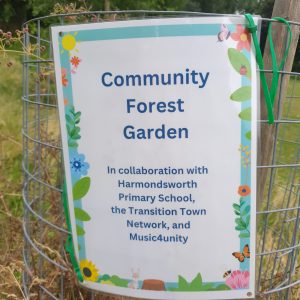
Georgia and Aanka are always looking out for ideas and opportunities to bring these communities together, and Aanka’s expertise around diversity has brought new energy to Transition Heathrow. The historical marginalisation of all these communities is especially brought to surface by the Commonwealth War Graves and historical buildings of the area – a less discussed but always looming presence of how the communities have been under-served and drawn on as resources.
I asked them what their longer term plans would be for the work they’d most like to do. “I’d love to create an eco arts political education hub in Heathrow”, Georgia told me, “a building that could be used for all those things and maybe as the theatre for Heathrow the Musical!”
Finally I asked Georgia whether she feels the Third Runway will actually ever be built.
“As long as there are greedy people, they will keep trying”, she told me. “But hopefully as environmental issues rise up the agenda, it becomes less and less likely. While it’s quiet and in a hiatus, we need to use this time to build community resilience and grounded networks and relationships in the villages”.
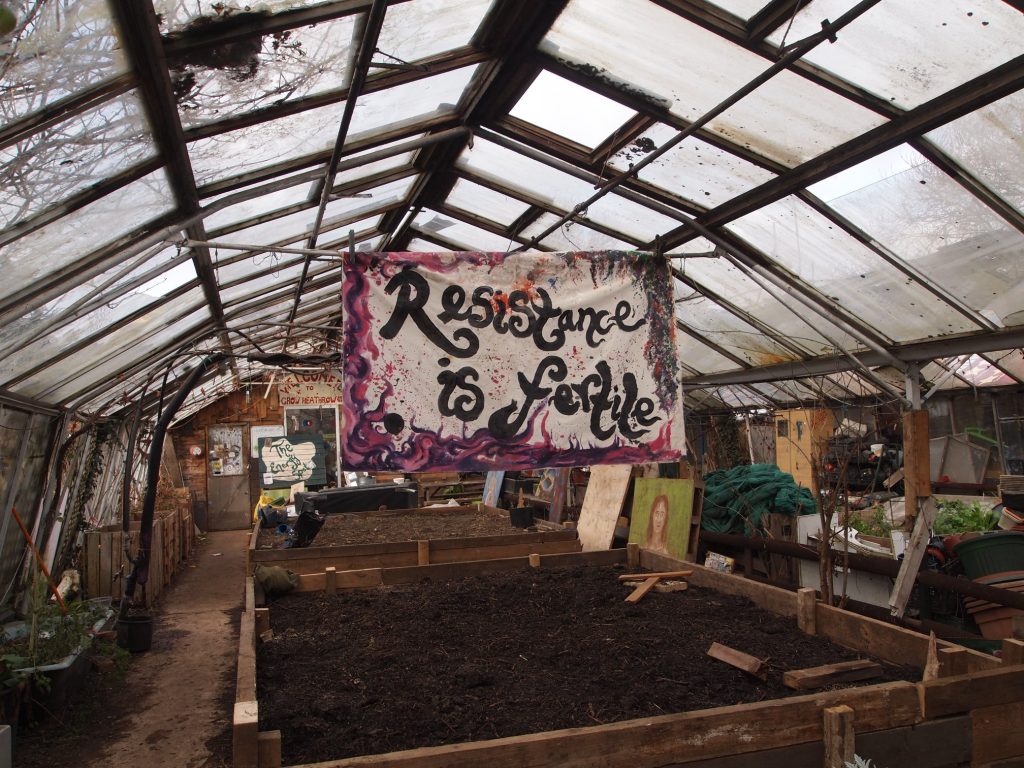
“Resistance is fertile” Transition Heathrow has always been an expression of where ‘yes’ meets ‘no’ says Georgia, of resistance and reimagining what a thriving, resilient and inclusive community could be in the villages overshadowed by the UK’s largest airport.
Find our more about Music4Unity and Transition Heathrow, on Facebook page.
Explore the history of Grow Heathrow in this short video from 2011:


